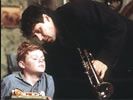Eye For Film >> Movies >> The Butcher Boy (1997) Film Review
Between Neil Jordan's passion for Patrick McCabe's novel and the filming of it, something is lost. Perhaps the concept proved too personal.
Francie Brady is 12. His ma is a manic depressive, his da an alcoholic. They live in a small Irish town, close to the border. His best friend Joe is his sidekick, blood brother and Red Indian brave. His least favourite person is Mrs Nugent, a stuck-up prig, who finds a chancer like Francie beneath contempt, especially when he tries to kill her darling little boy, a swotty drip who wears hand-knit jumpers and specs. Francie sees things, such as aliens' heads on priests and the Virgin Mary. Having this sort of an imagination doesn't disturb him. He's grown used to it.

When his ma is taken to hospital after a breakdown, he thinks of her going to the garage for a service. When his da falls asleep, dead drunk, in the comfy chair, he has long conversations with him. When he bums a ride to Dublin, he sees it as an adventure, not an act of defiance. "The trouble with running away from home is you can't take your mother with you," he says, wisely, and so comes back.
Francie's life is sad and difficult, although he never lets it get him down. There is a confidence about him as well as a threat. The otherness, the violence, can burst out as easily as gentle sweetness. At times he has a bully's traits, at others a saint's compassion. He's treated with caution by grown-ups, as if the anger that lurks there is tainted with madness.
Jordan and McCabe rely heavily upon a voice-over narrative, which gives the film a literary overtone. Francie is capable of fearful behaviour and yet is presented as the dashing hero of his boyhood. Eamonn Owens enjoys himself enormously. He has never acted before, which matters little. He'll try anything once. Usually it works. His broad, open face contradicts Francie's tricky nature. It is impossible to believe that this boy has a cruel bone in his body. During the later stages, Jordan indulges magic realism, which has the effect of dropping dream sequences into a tight drama.
The film captures paraochial Irish life in the early Sixties and does not skimp on the usual characters. Fiona Shaw (Mrs. Nugent) maybe a breath away from an Ugly Sister and yet is so wonderfully awful, she sparkles. Stephen Rea (da) is in one of his morose moods. The effort of opening his mouth to speak becomes painful to watch. Francie is a baby monster. It doesn't fit. His mother, despite her sadness, cares for him. His father, despite his sense of failure, loves him. The priests, despite occasional overexcitement, watch over him. He has Joe, before he moves on, and the little town with it's kindly housewives and chatty shopkeepers.
The Jordan/McCabe mix reflects sympathy-for-the-outsider and a boys-own delight in chaos. The spirit of Francie is caught between nostalgic memory and tragic recompense. It feels uncomfortable.
Reviewed on: 19 Jan 2001


















